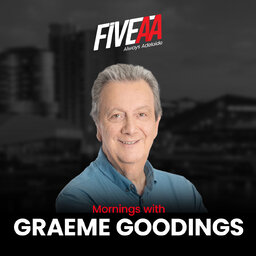Mornings with Graeme Goodings - 3 April 2025
Nathan Gray, Rex Patrick, Rob Simms, Tim Downie, John MacKillop, Brenton Cox, Sarah Hanson-Young and your calls.
Listen live on the FIVEAA Player.
Follow us on Facebook, X and Instagram.
Subscribe on YouTube
 Mornings with Graeme Goodings
Mornings with Graeme Goodings


